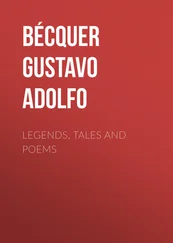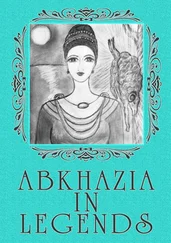Gustavo Bécquer - Romantic legends of Spain
Здесь есть возможность читать онлайн «Gustavo Bécquer - Romantic legends of Spain» — ознакомительный отрывок электронной книги совершенно бесплатно, а после прочтения отрывка купить полную версию. В некоторых случаях можно слушать аудио, скачать через торрент в формате fb2 и присутствует краткое содержание. Жанр: foreign_antique, foreign_prose, на английском языке. Описание произведения, (предисловие) а так же отзывы посетителей доступны на портале библиотеки ЛибКат.
- Название:Romantic legends of Spain
- Автор:
- Жанр:
- Год:неизвестен
- ISBN:нет данных
- Рейтинг книги:4 / 5. Голосов: 1
-
Избранное:Добавить в избранное
- Отзывы:
-
Ваша оценка:
- 80
- 1
- 2
- 3
- 4
- 5
Romantic legends of Spain: краткое содержание, описание и аннотация
Предлагаем к чтению аннотацию, описание, краткое содержание или предисловие (зависит от того, что написал сам автор книги «Romantic legends of Spain»). Если вы не нашли необходимую информацию о книге — напишите в комментариях, мы постараемся отыскать её.
Romantic legends of Spain — читать онлайн ознакомительный отрывок
Ниже представлен текст книги, разбитый по страницам. Система сохранения места последней прочитанной страницы, позволяет с удобством читать онлайн бесплатно книгу «Romantic legends of Spain», без необходимости каждый раз заново искать на чём Вы остановились. Поставьте закладку, и сможете в любой момент перейти на страницу, на которой закончили чтение.
Интервал:
Закладка:
“Onward!” Pedro exclaimed again, as if beside himself; he approached the altar and climbing upon it, he reached the pedestal of the image. All the space about clothed itself in weird and frightful shapes, all was shadow and flickering light, more awful even than total darkness. Only the Queen of Heaven, softly illuminated by a golden lamp, seemed to smile, tranquil, gracious and serene, in the midst of all that horror.
Nevertheless, that silent, changeless smile, which calmed him for an instant, in the end filled him with fear, a fear stranger and more profound than what he had suffered hitherto.
Yet he regained his self-control, shut his eyes so as not to see her, extended his hand with a spasmodic movement and snatched off the golden bracelet, pious offering of a sainted archbishop, the golden bracelet whose value equalled a fortune.
Now the jewel was in his possession; his convulsed fingers clutched it with superhuman force; there was nothing left save to flee – to flee with it; but for this it was necessary to open his eyes, and Pedro was afraid to see, to see the image, to see the kings of the sepulchres, the demons of the cornices, the griffins of the capitals, the blotches of shadow and flashes of light which, like ghostly, gigantic phantoms, were moving slowly in the depths of the nave, now filled with confused noises, unearthly and appalling.
At last he opened his eyes, cast one glance about him, and from his lips escaped a piercing cry.
The cathedral was full of statues, statues which, clothed in strange, flowing raiment, had descended from their niches and were thronging all the vast compass of the church, staring at him with their hollow eyes.
Saints, nuns, angels, devils, warriors, great ladies, pages, hermits, peasants surrounded him on every side and were massed confusedly in the open spaces and about the altar. Before it there officiated, in presence of the kings who were kneeling upon their tombs, the marble archbishops whom he had seen heretofore stretched motionless upon their beds of death, while a whole world of granite beasts and creeping things, writhing over the paving-stones, twisting along the buttresses, curled up in the canopies, swinging from the vaulted roof, quivered into life like worms in a giant corpse, fantastic, distorted, hideous.
He could resist no longer. His brows throbbed with terrible violence; a cloud of blood darkened his vision; he uttered a second scream, a scream heart-rending, inhuman, and fell swooning across the altar.
When the sacristans found him crouching on the altar steps the next morning, he still clutched the golden bracelet in both hands and on seeing them draw near, he shrieked with discordant yells of laughter:
“Hers! hers!”
The poor wretch had gone mad.
THE RAY OF MOONSHINE
I DO not know whether this is history which seems like a tale, or a tale which seems like history; what I can affirm is that in its core it contains a truth, a truth supremely sad, which in all likelihood I, with my imaginative tendencies, will be one of the last to take to heart.
Another with this idea would perhaps have made a book of melancholy philosophy. I have written this legend that those who see nothing of its deep meaning may at least derive from it a moment of entertainment.
He was noble, he had been born amid the clash of arms, and yet the sudden blare of a war trumpet would not have caused him to lift his head an instant or turn his eyes an inch away from the dim parchment in which he was reading the last song of a troubadour.
Those who desired to see him had no need to look for him in the spacious court of his castle, where the grooms were breaking in the colts, the pages teaching the falcons to fly, and the soldiers employing their leisure days in sharpening on stones the iron points of their lances.
“Where is Manrico? Where is your lord?” his mother would sometimes ask.
“We do not know,” the servants would reply. “Perchance he is in the cloister of the monastery of the Peña, seated on the edge of a tomb, listening to see if he may surprise some word of the conversation of the dead; or on the bridge watching the river-waves chasing one another under its arches, or curled up in the fissure of some rock counting the stars in the sky, following with his eyes a cloud, or contemplating the will-o’-the-wisps that flit like exhalations over the surface of the marshes. Wherever he is, it is where he has least company.”
In truth, Manrico was a lover of solitude, and so extreme a lover that sometimes he would have wished to be a body without a shadow, because then his shadow would not follow him everywhere he went.
He loved solitude, because in its bosom he would invent, giving free rein to his imagination, a phantasmal world, inhabited by wonderful beings, daughters of his weird fancies and his poetic dreams; for Manrico was a poet, – so true a poet that never had he found adequate forms in which to utter his thoughts nor had he ever imprisoned them in words.
He believed that among the red coals of the hearth there dwelt fire-spirits of a thousand hues which ran like golden insects along the enkindled logs or danced in a luminous whirl of sparks on the pointed flames, and he passed long hours of inaction seated on a low stool by the high Gothic chimney-place, motionless, his eyes fixed on the fire.
He believed that in the depths of the waves of the river, among the mosses of the fountain and above the mists of the lake there lived mysterious women, sibyls, nymphs, undines, who breathed forth laments and sighs, or sang and laughed in the monotonous murmur of the water, a murmur to which he listened in silence, striving to translate it.
In the clouds, in the air, in the depths of the groves, in the clefts of the rocks, he imagined that he perceived forms, or heard mysterious sounds, forms of supernatural beings, indistinct words which he could not comprehend.
Love! He had been born to dream love, not to feel it. He loved all women an instant, this one because she was golden-haired, that one because she had red lips, another because in walking she swayed as a river-reed.
Sometimes his delirium reached the point of his spending an entire night gazing at the moon, which floated in heaven in a silvery mist, or at the stars, which twinkled afar off like the changing lights of precious stones. In those long nights of poetic wakefulness, he would exclaim: “If it is true, as the Prior of the Peña has told me, that it is possible those points of light may be worlds, if it is true that people live on that pearly orb which rides above the clouds, how beautiful must the women of those luminous regions be! and I shall not be able to see them, and I shall not be able to love them! What must their beauty be! And what their love!”
Manrico was not yet so demented that the boys would run after him, but he was sufficiently so to talk and gesticulate to himself, which is where madness begins.
Over the Douro, which ran lapping the weatherworn and darkened stones of the walls of Soria, there is a bridge leading from the city to the old convent of the Templars, whose estates extended along the opposite bank of the river.
At the time to which we refer, the knights of the Order had already abandoned their historic fortresses, but there still remained standing the ruins of the large round towers of their walls, – there still might be seen, as in part may be seen to-day, covered with ivy and white morning-glories the massive arches of their cloister and the long ogive galleries of their courts of arms through which the wind would breathe soft sighs, stirring the deep foliage.
In the orchards and in the gardens, whose paths the feet of the monks had not trodden for many years, vegetation, left to itself, made holiday, without fear that the hand of man should mutilate it in the effort to embellish. Climbing plants crept upward twining about the aged trunks of the trees; the shady paths through aisles of poplars, whose leafy tops met and mingled, were overgrown with turf; spear-plumed thistles and nettles had shot up in the sandy roads, and in the parts of the building which were bulging out, ready to fall; the yellow crucifera, floating in the wind like the crested feathers of a helmet, and bell-flowers, white and blue, balancing themselves, as in a swing, on their long and flexible stems, proclaimed the conquest of decay and ruin.
Читать дальшеИнтервал:
Закладка:
Похожие книги на «Romantic legends of Spain»
Представляем Вашему вниманию похожие книги на «Romantic legends of Spain» списком для выбора. Мы отобрали схожую по названию и смыслу литературу в надежде предоставить читателям больше вариантов отыскать новые, интересные, ещё непрочитанные произведения.
Обсуждение, отзывы о книге «Romantic legends of Spain» и просто собственные мнения читателей. Оставьте ваши комментарии, напишите, что Вы думаете о произведении, его смысле или главных героях. Укажите что конкретно понравилось, а что нет, и почему Вы так считаете.












